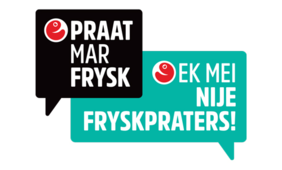People who learnt Frisian later in life, so-called 'nije Fryskpraters' ('new speakers of West Frisian'), use it only very sporadically, and this is partly due to the language attitudes of traditional speakers. This emerged last year from research conducted jointly by Ruth Kircher of the Mercator Research Centre on Multilingualism and Language Learning (part of the Fryske Akademy) and Mirjam Vellinga of the Afûk. Those research findings were reason for setting up an encouragement campaign that on the one hand encourages new Frisian speakers to persevere, but also calls on traditional speakers to support that much more.
Online campaign
Awareness, understanding and compliments are the main ingredients of the online campaign that launches today via Praat mar Frysk's various social media channels. New language learners often feel less comfortable using the language in conversations with traditional speakers. "Nije sprekkers moatte in drompel oer," says Mirjam Vellinga, project leader Language promotion at the Afûk. "Dat is altyd sa ast in nije taal sprekst. It is ek wennen om dysels oare klanken útsprekke te litten."
But besides linguistic uncertainty, the attitude of native speakers, traditional speakers, also plays a role: "Memmetaalsprekkers ferbrekke har bygelyks gau and geane oer op it Nederlânsk." This does not help new language learners and is often very demotivating. On the contrary, native speakers feel that it is indecent to speak the minority language (Frisian, in this case) when there are people around who do not understand it or understand it less well. "As minsken har dêr bewust fan binne, dan kinne se har gedrach feroarje," says Vellinga.
Tip or encouragement
The campaign therefore focuses not only on new Frisian speakers, but especially on native speakers of Frisian. The campaign consists of a number of short videos of native speakers of Frisian and of new Frisian speakers: what does Frisian mean to them? What do they think of the new language learners, and vice versa: what are their experiences with the native speakers? All videos end with a tip or encouragement.
In addition, people are called upon to record or write their own encouragement for all the people who are now busy learning Frisian or trying to speak more Frisian, the new Frisian speakers. Because: "In lytse oanmoediging, in komplimint en wat geduld wurde hiel bot op priis steld, benammen troch minsken dy’t it Frysk oan it learen binne. Kinst in taal allinnich mar leare ast dy faak om dy hinne hearst en brûke kinst. Dat is by in lytsere taal as it Frysk net altyd fanselssprekkend. Dêr hawwe wy inoar by nedich," says Ruth Kircher, herself a new Frisian speaker and researcher at Mercator/Fryske Akademy.
New Frisian speakers are an important group when it comes to preserving the Frisian language. Currently, a third of Frisian speakers are not Frisian speakers by birth. That's 150,000 people. A very large group, in other words.
More information
Information about the campaign Praat mar Frysk, ek mei nije Fryskpraters can be found here at Praat mar Frysk.
The project page can be found on Mercator's website: 'Nije sprekkers fan it Frysk: Promoasje fan it learen en brûken fan de taal om refitalisaasje te stimulearjen'.
The 'Nije Fryskpraters' project is a collaboration between the Mercator Research Centre for Multilingualism and Language Learning/ Fryske Akademy and the Afûk.



